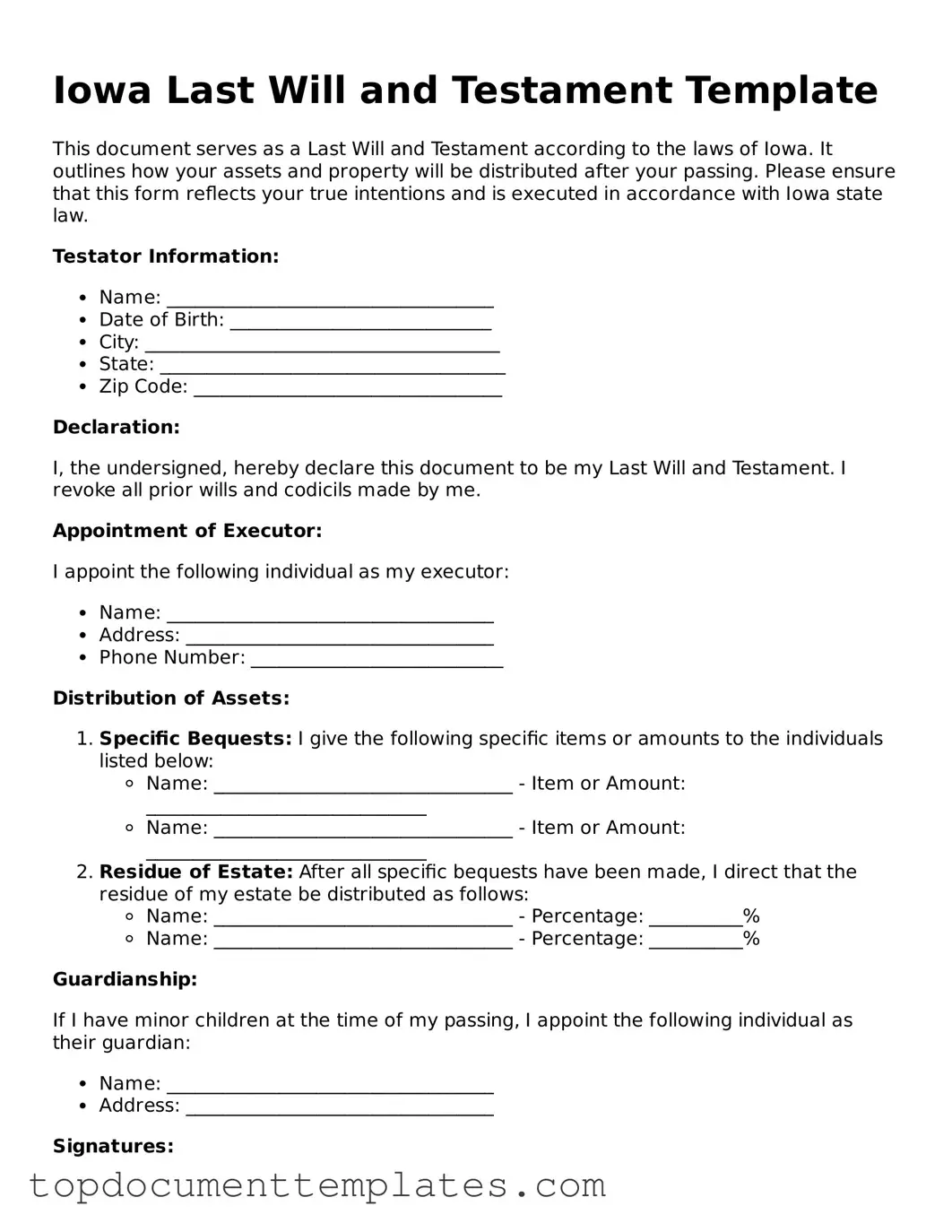Valid Last Will and Testament Form for Iowa State
Creating a Last Will and Testament is an essential step in ensuring that your wishes are respected after your passing. In Iowa, this legal document allows you to outline how your assets should be distributed, appoint guardians for minor children, and designate an executor to manage your estate. It’s a straightforward process that provides peace of mind, knowing that your loved ones will be taken care of according to your wishes. The Iowa Last Will and Testament form includes sections for identifying the testator, detailing specific bequests, and outlining the general provisions that govern the distribution of your estate. Additionally, it requires signatures from witnesses to validate the document, ensuring that it meets state requirements. Understanding these key aspects can help you create a comprehensive will that reflects your intentions and protects your family’s future.
Similar forms
- Living Will: A living will outlines a person's wishes regarding medical treatment in case they become unable to communicate those wishes. Like a Last Will and Testament, it serves to express preferences, but it focuses on healthcare decisions rather than the distribution of assets.
- Durable Power of Attorney: This document allows someone to make financial or legal decisions on behalf of another person. Similar to a Last Will, it designates authority, but it takes effect during the individual's lifetime rather than after death.
- Trust: A trust is a legal arrangement where one party holds property for the benefit of another. Both a trust and a Last Will involve the management and distribution of assets, but a trust can take effect during the grantor's lifetime, offering more control over asset management.
- Non-disclosure Agreement: A Non-disclosure Agreement is essential for protecting sensitive information, particularly in business dealings. It ensures that parties involved maintain confidentiality, making it vital for various transactions. For more details, visit OnlineLawDocs.com.
- Health Care Proxy: A health care proxy appoints someone to make medical decisions for an individual if they are unable to do so. This document is similar to a Last Will in that it designates a trusted person to act on behalf of the individual, focusing on health care rather than estate distribution.
- Codicil: A codicil is an amendment to an existing will. It allows changes to be made without creating an entirely new Last Will. Both documents serve to express the wishes of the individual regarding their estate, but a codicil specifically modifies an existing will rather than establishing a new one.
Guidelines on Writing Iowa Last Will and Testament
Once you have the Iowa Last Will and Testament form, you will need to fill it out carefully. This document is important for outlining your wishes regarding your estate. Follow these steps to complete the form accurately.
- Start with your full name. Write it clearly at the top of the form.
- Provide your current address. Make sure to include the city, state, and zip code.
- State your date of birth. This helps confirm your identity.
- List any previous wills. If you have made any before, indicate this clearly.
- Designate an executor. Choose someone you trust to carry out your wishes. Write their full name and contact information.
- Outline your beneficiaries. Clearly name the people or organizations who will inherit your assets. Include their relationship to you.
- Specify the distribution of your assets. Be as detailed as possible about what each beneficiary will receive.
- Include any special instructions. If there are specific wishes regarding your belongings, write them down.
- Sign and date the form. Your signature is essential for the document to be valid.
- Have witnesses sign the document. Iowa requires at least two witnesses who are not beneficiaries.
After completing the form, keep it in a safe place. Consider sharing the location with your executor and trusted family members. This way, your wishes can be easily followed when the time comes.
File Information
| Fact Name | Details |
|---|---|
| Governing Law | The Iowa Last Will and Testament is governed by Iowa Code Chapter 633. |
| Age Requirement | In Iowa, individuals must be at least 18 years old to create a valid will. |
| Witness Requirement | Two witnesses are required to sign the will for it to be valid. |
| Revocation | A will can be revoked by creating a new will or by destroying the original document. |
| Holographic Wills | Iowa recognizes holographic wills, which are handwritten and signed by the testator. |
Other Popular Last Will and Testament State Forms
Can You Legally Write Your Own Will - Can outline any debts or obligations that need to be settled before distribution.
When creating a legal document like a Power of Attorney form in Texas, it's crucial to understand its significance in managing various affairs on behalf of another individual. This document serves as a vital resource for ensuring that responsibilities and decisions align with a person's intentions, especially during times of incapacity. For comprehensive guidance on this matter, consider visiting TopTemplates.info, which offers valuable insights into the intricacies of Power of Attorney forms.
How to Create a Will in California - A straightforward way to communicate your final wishes to your loved ones.
